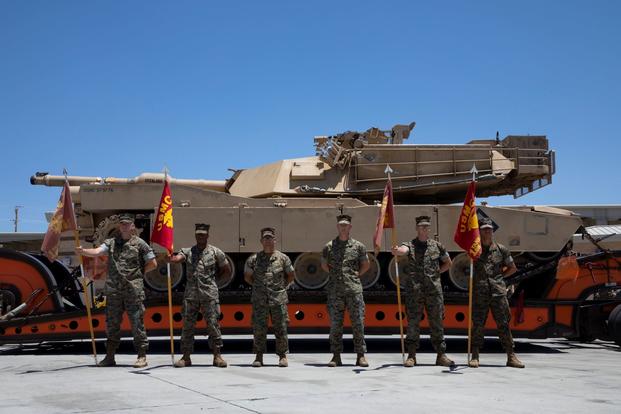Maj. Adam Link won't miss the smell of the inside of a tank after a days-long mission with a four-man crew.
But the bond and the closeness Marines formed during those hours together inside the armored vehicles -- that's going to be tough to find anywhere else, he said.
"It's hard to replicate in any environment except for [tanks]," Link, who joined 1st Tank Battalion as a lieutenant in 2009. "I mean, you're within arm's reach of three other people all day every day for multiple days on end."
Read Next: These Are the First Military Bases Whose Confederate Names Could Be Changed
That bond between tankers is the envy of Marines in other fields, Maj. Gen. Roger Turner Jr., the head of 1st Marine Division, said Friday as the California-based 1st Tank Battalion held its deactivation ceremony. The ceremony symbolized a bittersweet end to the mission for 1st Marine Division, after decades of tanks supporting ground troops in combat zones.
Lt. Col. Benjamin Adams, 1st Tank Battalion's commanding officer, on Friday called the unit's deactivation one of the most challenging missions it has had to execute. His Marines were not out of a job, but also faced professional uncertainty during a global pandemic.
"That was terrifying," Adams said.
Commandant Gen. David Berger told reporters in 2019 that the Marine Corps would likely need to shed some military occupational specialties as the service reorganized to take on new threats.
"We are too heavy, too cumbersome," Berger said. "We are built for another Desert Storm. We have to go on a diet."
About five months later, Berger announced in a sweeping force-wide restructuring that the Marine Corps would no longer operate tanks. Since its 1941 activation, 1st Tank Battalion saw combat in World War II, the Korean War, the Vietnam War, Iraq and Afghanistan.
It hasn't been easy to see that end, but Link, who led 1st Tanks' Delta Company, said he sees the unit's deactivation as an opportunity to celebrate the battalion's contributions.
"Tanks have gone everywhere the Marine Corps has gone since 1941 and contributed hopefully to bringing more Marines home alive than otherwise might have happened had they not been present," he said.
Link was working as a congressional fellow on Capitol Hill when Berger's force design plans were announced. While it was surprising on a personal level to learn his community wouldn't have a future in the Marine Corps, he said the decision makes sense considering where leathernecks might be called on to fight.
"Given the problems that confront the Marine Corps as a result of what was in the National Defense Strategy, there were certain things we need to take a hard look at," he said. "Part of that was how do we get at the problem and in the Pacific and how do we better support the Navy?"
Link predicts this is one of just many big changes facing the military as threats from China and Russia increase. Tank Marines can either choose to be upset about it, he said, or find a new path in the Marine Corps.
"I love being a tanker, but I'm a Marine," said Link, who's now pursuing a career as a cyber officer. "This is just an opportunity for a lot of us to say, ... 'Where can I go to have a meaningful impact that's important to me?'"
Link is one of about 260 Marines who've made lateral moves into new military occupational specialties. About 60% of the officers who've found new jobs have moved into intelligence, logistics or cyberspace roles, manpower officials told Military.com last month. The major said he's one of five former tank officers at his schoolhouse.
Capt. Joseph DiPietro, a former tank officer, said in a video released by 1st Marine Division this week that those leaving the folding community have a lot to offer.
"Tankers are workhorses," DiPietro said. "These Marines stay up all night to fix an engine or fire control system. They work in 120-degree heat changing track sections that weigh hundreds of pounds and they have fun doing it.
"These Marines," he added, "would move a mountain if it helped an infantry unit close with and destroy the enemy and that mentality remains."
Tank Marines' contributions and legacy won't be forgotten, Turner said during the deactivation ceremony.
"You always demonstrate true grit," Turner said. "Tankers would fight all day ... and then they work on their tank all night. There's no time for sleep because you're either maintaining the tank or you're fighting in the tank.
"We always held you guys in incredibly high regard because of that," he said.
-- Gina Harkins can be reached at gina.harkins@military.com. Follow her on Twitter @ginaaharkins.
Related: As Tank Battalions Shut Down, Dozens of Marines Are Joining the Army












